This is the third of a four-part series in which we seek to see anew the incarnation of Jesus through the eyes and body of a woman, Mary the mother of Jesus.
For Jesus to live, he had to nurse from his mother’s breast.
The mouthpiece of the incarnation is the open mouth of the infant Jesus rooting for his mother’s breast. Mary’s body sings back to her baby son the song of the kin-dom of God. The poor will be lifted up. The young, the helpless, the weak, will be made strong.
Jesus’ vulnerable little body speaks, singing songs of hunger that sound much like crying. An infant crying to be held, to be comforted and to be loved. To be fed. This is the song of steadfast love mother and child sing to each other. A song of intimate, deep knowing with a pattern of peace — deep longing, peace, deep longing and repeat.
Mary gave her baby the gift of her body, her milk, her presence, her song from the Holy Spirit, her wisdom. She gave with deep and far-reaching knowing. We cannot mistake her wisdom when we hear her song the Magnificat.
“My soul magnifies the Lord, and my spirit rejoices in God my Savior,
for he has looked with favor on the lowly state of his servant.
Surely from now on all generations will call me blessed,
for the Mighty One has done great things for me,
and holy is his name; indeed, his mercy is for those who fear him
from generation to generation.
He has shown strength with his arm;
he has scattered the proud in the imagination of their hearts.
He has brought down the powerful from their thrones
and lifted up the lowly;
he has filled the hungry with good things
and sent the rich away empty.” — Luke 1:46-53
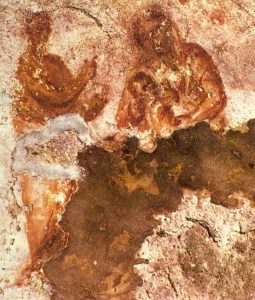 Some of the oldest images of the nursing Christ child are damaged, like the Italian fresco shown below. Scholars think the often-portrayed pattern of the child Jesus feeding from the breast of his mother while turning his face to look toward the viewer was a deliberate message to the Catholic Church about the Eucharist. The church understood the blood and body of Christ offered in Communion was from the incarnated Jesus — this was shared with Mary because of the misconception that breast milk was processed blood. Breast milk was thought to be life blood to infants and deeply connected to the Eucharist table for the Christian life for some time. The breast milk of Mary was even thought to be healing by some.
Some of the oldest images of the nursing Christ child are damaged, like the Italian fresco shown below. Scholars think the often-portrayed pattern of the child Jesus feeding from the breast of his mother while turning his face to look toward the viewer was a deliberate message to the Catholic Church about the Eucharist. The church understood the blood and body of Christ offered in Communion was from the incarnated Jesus — this was shared with Mary because of the misconception that breast milk was processed blood. Breast milk was thought to be life blood to infants and deeply connected to the Eucharist table for the Christian life for some time. The breast milk of Mary was even thought to be healing by some.
After I had given birth to my second child, I went to a baby shower for my sister at a home in my neighborhood. I was still on maternity leave, the baby was doing well, and I didn’t want to miss the shower. It was at the home of a church member and long-time friend of the family. A small group of women passed my beautiful newborn around while we enjoyed celebrating my sister’s pregnancy, appropriately oohing and ahhing over the baby clothes that would soon clothe my first nephew.
As I was gathering up the diaper bag to prepare to leave, one of the women I had known since I was in grade school came up to me and asked me when my baby was due. I paused for a moment trying to decide what I could say, trying to remind myself I am a pastor at her church, and finally I pointed to my child my mother is holding and say, “That is my baby; he was born two weeks ago.” I don’t remember what she said if anything. She fumbled around, obviously embarrassed, and made her exit.
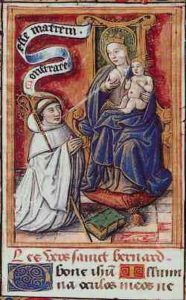
St. Bernard, cured of an eye ailment or receiving great wisdom according to legend upon receiving the breast milk of Mary in a dream or vision.
I felt a little hurt but mostly angry. I wanted to be involved with my family, with my community, with my faith family. I was nursing a large newborn infant (he was more than 9 lbs. at birth). My body took up a lot up space at this point — my breasts were as large as my postpartum belly. My body was absolutely doing what it was supposed to do, but my female friend did not tell me that with her careless behavior and words.
I have found quite often that some people in churches have told me my body was not acceptable or made them uncomfortable when it was doing exactly what was needed. My child needed to be fed. My child needed my body. But my church friends and often my church female friends told me I needed to be smaller and if I would just disappear or stay out of sight that would be OK too.
Whether we have nursed or bottle fed our children, mothers and fathers of all kinds of diverse family makeups always will be physically connected to their children.
With each of my own children, I have different physical connections. With my youngest child, her cheeks are the softest, most wonderfully smooth to kiss and snuggle. Now that she is almost 12 years old, she does not like kisses all that often anymore, but I have kissed her in that same exact spot since she was born. It connects us. The skin-to-skin intimacy is so special. She is my last baby, and I can feel this type of intimacy slipping away. I treasure each kiss, as I know there will be fewer and fewer as she grows and matures and needs her body to be more separate from my own.
In Hopes and Fears: Everyday Theology for New Parents and Other Tired, Anxious People by Bromleigh McClenneghah and Lee Hull Moses, McClenneghan says this about breastfeeding her children, “I am, to borrow a phrase, only sorta-crunchy, by which I mean that I nursed, and I loved nursing, but now that I’m not nursing, I absolutely cannot get my head around the fact that I shared that with my kids. It’s natural and beautiful and inexpensive … but they sucked my boobs!”
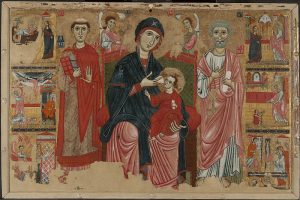
Virgin and Child Enthroned with Saints 1871 by Magdalene Master. Yale University Art Gallery.
Jesus shows us he was vulnerable, fully human, needy at the breast of his mother. He had to receive Mary’s body. He sucked his mother’s boobs! This may be uncomfortable for some men to hear, even some women. Even so, he had to be fed by a woman. He showed us with his body he received the gift of nurture, of sustenance. This is part and parcel of the revelation of incarnation. We must understand the framework of kin-dom of this covenantal language of incarnation that crosses over to that of Resurrection and Communion. Mary’s body is first offered to Jesus to take and eat and drink. Mary’s body first speaks the language of what will become the table of love.
By the time my third child was born, I had a full table. Three children and a three-bedroom home that was way too small. I also nursed this third child, but she and I struggled; at about four months, she did not seem to want to latch for long enough to get enough nourishment. She was fussy. I was back at work, stressed and tired but I knew how to do this — I thought. I took her to the pediatrician to discuss and check the growth chart. She wasn’t gaining weight as well as we would have liked.
He asked me if I could give her formula. I said, yes, I guess so, but I’d rather breastfeed. He shrugged and said sometimes the easiest answer is OK. I struggled a bit but decided to see how it went supplementing with formula. Turned out, she loved the bottle and began to thrive and grow. I was more than just a little sad but glad she was healthy and happy and some of the pressure was off me to be the one always needing to provide the milk.
For that time and season, it was what we all needed. This gave my spouse an opportunity to bond with her a bit more than he had with our first two at that age. In fact, she often saw the two of us as one being, calling us “Mommydaddy” for quite a while.
Like the incarnation, I wonder if the youngest of humanity have taught us the most about the true nature of God and God’s kin-dom.
The model of the water basin and the towel, like the gift of the breast, is a gift of servanthood, of both giving and receiving. Peter balks in receiving this powerful gift of foot washing offered by Jesus. He does not want to simply receive because he thinks this is beneath a king such as Jesus. But Jesus already has learned from his mother that kin-dom (not the hierarchy of king-dom) is especially for the weak, we kneel and humbly open ourselves to receive the gift of the cool moist cloth against our dry and thirsty skin. Peter eventually relents and Jesus washes his feet, an example of humility and equality.
We, too, are invited to receive the gift given freely and then we also can freely give. Our collective voices join with each other in sharing gift, sharing power, in a wider love. A wider and stronger Communion table.
With our gifts we shape the world:
With mother’s milk.
With a mother’s wisdom.
With a parent’s fierce unconditional love.
With intimacy’s gift of grace and mercy.
With humility.
With arms open wide to receive.
With forgiveness.
With the strength of peace.
I was a wall, and my breasts were like towers; then I was in his eyes as one who brings peace. — Song of Songs 8:10
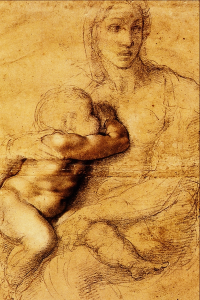
Michelangelo, Madonna with child
How we see Advent through the eyes, through the body of Mary, colors our experience anew:
White milk of persistence: With a touch of pink from the blood from cracked nipples that bleed with pain from the hungry mouths of babes. Breastfeeding is no easy task.
White milk mixed with red-pink of suffering:For those who have and are suffering from breast cancer. We mourn with women and men who suffer from this disease and who must undergo lumpectomies and mastectomies. The pain of losing parts of our bodies and even loved ones to disease is great.
White milk or powder of formula of nourishment: A wonderous concoction that nourishes our babies and helps them grow. There is no shame in formula. Fed is best. All babies deserve to be nourished and fed so they can grow and thrive like baby Jesus. “Jesus increased in wisdom and in years and in divine and human favor.” — Luke 2:52
White milk for reflection: May we be incarnate people of God, people capable of both humbly giving and receiving. May we live by Mary’s wisdom, bringing peace and equality into the world. In doing so, we must give up our own places of power and influence and join with others at a wider, stronger table. May we truly embody our faith like Mary. Amen.
But when the fullness of time had come,
God sent his Son, born of a woman,
born under the law, in order to redeem those who were under the law,
so that we might receive adoption as children. — Galatians 4:4-5
Work hard
Play harder
Love hard
And the bare scars like shiny silver armor
Speak the truth
Even when it burns like hell
And reap the fruits
That are owed to you
and take no prisoners to The Temple
— The Temple by Jessica Luxx
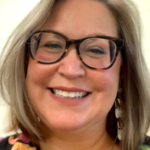
Julia Goldie Day
Julia Goldie Day is an ordained minister within the Cooperative Baptist Fellowship and lives in Memphis, Tenn. She is a painter and proud mother to Jasper, Barak and Jillian. Learn more at her website or follow her on socials @JuliaGoldieDay.
Previous article in this series:


